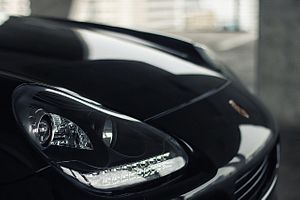Drivers of dark-colored cars in Ashgabat have reportedly had their cars towed to a government lot and upon retrieval ordered to repaint the vehicles white or silver. According to the Chronicles of Turkmenistan, an opposition website, as of January 2018 black cars have been banned in Turkmenistan.
Radio Azatlyk, RFE/RL’s Turkmen Service, reported that there was no official announcement but that individuals reported having been ordered to repaint their cars. According to one Azatlyk source, the price of a paint job has skyrocketed accordingly.
On the car front, Ashgabat has issued various absurd rules. Tinted windows have been banned since 2014 and in 2015 Ashgabat banned the import of black cars — a signal of things to come. Also in 2015, there were restrictions put on engine size for imports.
With no official announcement and no official reason, we’re left speculating the reason for the apparent order. Turkmenistan’s leaders have long had a fetish for the color white. First President Saparmurat Niyazov’s famous gold statue of himself, which totated to face the sun, was mounted on a marble tripod pedestal; current President Gurbanguly Berdymuhamedov unveiled his own gold self, riding a horse, atop a marble cliff in 2015. Ashgabat, the country’s capital, is famously filled with marble buildings — so many it made it into the Guinness Book of World Records in 2013 with 543 new buildings clad with more than 48 million square feet of white marble.
What’s the point?
The key here is to look past the absurdity and pay attention to the impact. The person who spoke to Azatlyk mentioned that he was told that repainting his car would cost 7,000 manat ($1,996) and that the price would go up to 11,000 manat ($3,137) if he waited a week. His salary: 1,000 manat ($285).
As Bruce Pannier and Luca Anceschi note in their recent article for openDemocracy, Turkmenistan’s economic troubles are severe, as are the repercussions for state stability.
“In the regime’s authoritarian worldview,” they write, “it is Turkmenistan’s wider population — and not the élites surrounding the president — that has to be hit most severely by this deepening economic crisis.” This has come as shortages — particularly with respect to flour, sugar, oil — and price increases; lack of access to hard currency, with bank machines often empty of actual cash and Turkmen abroad limited to drawing out only $50 per day. Meanwhile, in the rush to put on a good show for the Asian Indoor and Martial Arts Games in September, Ashgabat garnished the wages of state employees by 20-30 percent — officially a “donation.”
Pannier and Anceschi call this a “terminal crisis” — a crisis from which there is no exit without radical change in economic policymaking. Importantly, there is no democratic means of changing course in Turkmenistan. A dissatisfied public has no outlet to either complain or motivate change.
The story of the black car ban — the arbitrary rulemaking that autocrats enjoy — is just another footnote in what could be a slow burn into real crisis.
































